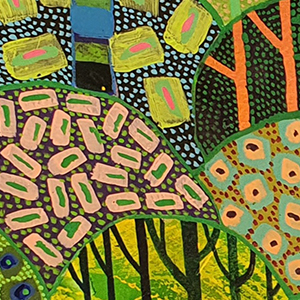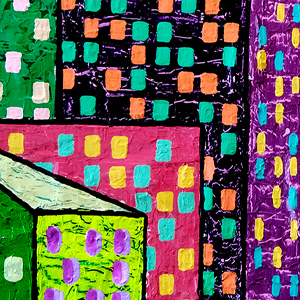
Abundant Virtue
The Virtues of Giving and Receiving
Generosity, Gratitude, and Transcendent Indebtedness
Sarah A. Schnitker
Artwork: “The Village Fete” by Charlotte Wensley © 2023
As a college student (and perhaps even more so as a PhD student), I relished a gathering that included free food. I was far from alone in this sentiment, and I was not nearly as zealous as some of my peers who would come to free-food events with Ziploc bags and cargo pants to maximize the opportunity. In most cases, we knew the food was intended to gain our attention, but we still appreciated the sustenance. In other cases, we would feel deeply grateful when people fed us knowing our attention was not dependent on the proverbial carrot (in actuality, a pizza) or when they fed us with a home-cooked meal.
As a student, I could not always reciprocate the generosity. However, I knew that when I was a faculty member with more resources, I would pay forward such hospitality to my students, continuing the cycle of gratitude and generosity essential for building a moral community.
Yet, things are changing. This past semester, I was in a conversation with leaders of Christian Study Centers and Institutes of Catholic Thought about ways they might cultivate gratitude and generosity in students. These para-academic organizations are focused on revitalizing Christian higher education in response to the increasing secularization of US elite colleges and universities by coming alongside non-religiously affiliated institutions to provide opportunities for students and faculty to integrate faith and knowledge. They engage university members with the Christian intellectual tradition by providing intellectual fellowship and hospitality.1 Given their focus on hospitality, they are a promising context for cultivating gratitude and generosity, as members of their communities tend to both give and receive. We were discussing science-informed strategies for cultivating these virtues when one of the leaders raised a new concern being voiced by students. The students expressed ambivalence—and some even fully objected—to the home-cooked meals that were served weekly. Though already committed to the faith tradition, the students were concerned that the food might be weaponized to control or influence them. And they felt this way about all offerings of free food. They were uncomfortable with receiving something for which they did not work, could not pay, or could not immediately repay.
At first, I was surprised by this sentiment, which is so different from when I was a student, but as I considered the situation as a psychologist, I became alarmed. The US is facing an epidemic of loneliness unparalleled in our country’s history—enough for the Surgeon General to publish a public health advisory.2 This crisis of (dis)connection extends to the spiritual realm, with students reporting lower and lower levels of religious affiliation and connection.3 There is no doubt that these increases in loneliness4 and spiritual/religious struggles5 have contributed to the alarming spike in symptoms of mental illness in adolescents and emerging adults as well as increased suicidal thoughts and behaviors.6
In an era of disconnection, we must find ways to help students reconnect with other people and the transcendent. One of the best ways to build social connections is through the experience of gratitude in response to generosity. Yet—the students were trying to avoid the very gratitude experiences critical for their flourishing! How can we understand what is happening here, and what might be done to remedy the situation?
Gratitude and Generosity: An Upward Cycle to Build Relational Flourishing
Scientific research supports the myriad benefits of practicing gratitude and generosity. Although individual health and wellness benefits are most often touted in the popular media, the real power of gratitude in response to generosity is its ability to cultivate moral communities. University of North Carolina psychologist Sara Algoe proposes that gratitude helps people find potential relationship partners, binds people to each other, and reminds us of the people who care for us.7 Other studies show that when people feel grateful, they are more likely to help others8—even strangers who have not directly benefitted them.9 When we receive generous gifts from others, we feel grateful and indebted to our moral community, which motivates us to act generously. Gratitude and generosity are the bedrock of forming communities where people are bonded together in positive relationships.
This upward cycle of generosity activating gratitude, which activates further generosity plays out in how people relate to God as well. Numerous faith traditions present gratitude in response to good gifts from the deity as a primary motivation for moral behaviors. In Christianity, Aquinas maintains believers have an ethical obligation to feel grateful and indebted to God as creator and savior. Because humans can never pay back God for the grace bestowed, they respond by worshipping God, loving others, and obeying God’s commands.
Two Types of Indebtedness
Given all these benefits of gratitude and generosity for building community and faith, why are students today showing such aversion to receiving benefits from others that would activate gratitude? Research on indebtedness is illuminating. Whereas gratitude is often experienced positively—you get that warm fuzzy feeling when you feel grateful, the indebtedness that can accompany gratitude is aversive to some people. When gift-giving within social relationships is construed in a transactional manner representative of a market economy, receiving a gift can feel burdensome. The students who didn’t like free food might feel burdened with a debt that they have to repay as soon as possible, or it will compound to a greater debt with time—like their student loans. This transactional way of thinking about human relationships is not new to students, but cultural forces have likely magnified its salience. The liturgies of daily life, including the consumeristic patterns of higher education and online interactions where social worth might be quantified in likes or followers, shape students to think of relationships and themselves as commodities within a market economy. It is unsurprising, then, that incurring debts as recipients of generosity would strike students as undesirable.
However, there is another way of thinking about relationships in communities that changes the experiences of indebtedness. Jenae Nelson, a former postdoctoral researcher in my lab who is now an Assistant Professor at Brigham Young University, proposed a distinct form of indebtedness that is experienced positively and builds relationships: transcendent indebtedness.10 In contrast to experiences of transactional indebtedness whereby people feel they have to repay benefits, transcendent indebtedness operates within interdependent relationships whereby people feel that they want to repay or pay forward what was given to them. With transcendent indebtedness, people see the opportunities to receive as ways to build a bond of interdependence and care.
Scientific evidence shows experiences of transcendent indebtedness can build social connections.11 Rather than seeing social interactions in terms of a commodity mindset, a transcendent framing suggests that people are co-creating a relationship or community that is an end in and of itself and has value apart from meeting the needs of the individuals involved. The New Testament teachings on the church as the body of Christ illustrate this principle well. Christians are not taught to trade services in the body of Christ (e.g., the hand does not say I’ll cut up food in exchange for locomotion from the foot); instead, the point of being part of the church is to build a collective entity that is the presence of Christ in the world. Christians mutually give and receive with each other because they have received immeasurable grace from God.
Modeling a Moral Community to Foster Transcendence
As our students experience increasing levels of loneliness, one promising path for cultivating connection and flourishing is to help them embrace relationships marked by generosity and gratitude that activate transcendent—not transactional—indebtedness. But how can educators activate a transcendent framework for relationships instead of a transactional one? How should the leaders of Christian study centers or institutes for Catholic thought respond to student objections to a free meal?
There are no easy answers as the cultural forces pushing humans to think of each other in transactional terms are strong. One approach is to create communities that are modeled after gift economies, which are pre-currency models of exchange whereby gifts circulate from one member of the group to another until they eventually return to the original giver.12 A fascinating example of how a gift economy might be created in modern times is the 7 Cups online community (7cups.com), where people can receive social support and care from trained listeners. Rather than relying on a transactional model of mental health support whereby customers pay for therapeutic services, the community trains lay individuals to provide supportive listening to those in need. People often come to the online community seeking out supportive listening for themselves, and then they will volunteer as trained listeners to contribute back to the community. Because money is not exchanged, there is a sense of genuine connection within the community. The indebtedness evoked when a 7 Cups member is listened to is transcendent—a sense of wanting to pay back to the larger community rather than having to pay off a debt to the volunteer who listened. This online community stands in stark contrast to most online spaces where the user is the product sold to advertisers; on 7 Cups, time and attention are gifts to give and receive rather than buy and sell. As educators, we might ask ourselves whether the communities we foster resemble the gift economy of 7 Cups or the transactional marketplace of commodities.
Cultivating Gratitude, Transcendent Indebtedness, and Generosity
In addition to evaluating the ways our communities are structured that might influence whether they foster transactional versus transcendent views of relationships, educators can also provide opportunities for students to develop the virtues of gratitude, transcendent indebtedness, and generosity. Gratitude might be more easily caught than taught, so educators should start by modeling these virtues in their own interactions with students and peers. However, there are a variety of scientifically vetted activities for building gratitude and transcendent indebtedness, which can then activate generosity.
Pop culture and the self-help industry are replete with instructions to keep a gratitude journal; this can be good advice but with a major caveat. Recent research out of my lab found that practicing gratitude non-relationally (i.e., listing things for which I am grateful) in contrast to relationally (i.e., writing about how I am thankful to a person) elicited equal levels of felt gratitude but diverging levels of empathy and transcendent indebtedness.13 The participants who wrote only the things for which they were grateful showed decreases in empathy and transcendent indebtedness during the weeks they wrote the gratitude list! We need to move beyond asking our students and ourselves what we are grateful for toward asking ourselves who we are grateful to if we want to cultivate gratitude in a way that also orients people to feel morally connected to others. Even in instances with no immediately apparent person to thank (e.g., a beautiful sunset), people may express gratitude to God or some other spiritual entity, which fosters a sense of connection.
And these connections are critical. As death by suicide is the 3rd leading cause of death among 15–24-year-olds in the US,14 we might even say the survival of our students depends upon increasing connection. Even if our students are uncomfortable with the rhythms of giving and receiving in relationships, we should not abandon these practices. As educators, we can envisage relationships in a transcendent framework for our students to foster the virtuous practice of gratitude, transcendent indebtedness, and generosity—the essential ingredients to building and maintaining social connections and combatting loneliness. So, keep the free food coming.
Notes
- Theodore F. Cockle, et al. “Christian Higher Education at Secular Universities: A Multiple-Case Study of Christian Study Centers and Institutes for Catholic Thought,” Christian Higher Education (2024): 1–23.
- US Surgeon General. “Our Epidemic of Loneliness and Isolation,” The US Surgeon General’s Advisory on the Healing Effects of Social Connection and Community 2023 (2023).
- Jeffrey M. Jones. “Church Attendance Has Declined in Most US Religious Groups,” Gallup (2024).
- Farhana Mann, et al. “Loneliness and the Onset of New Mental Health Problems in the General Population,” Social Psychiatry and Psychiatric Epidemiology 57.11 (2022): 2161–2178.
- Margaret F. Bockrath, et al. “Religious and Spiritual Struggles and their Links to Psychological Adjustment: A Meta-Analysis of Longitudinal Studies,” Psychology of Religion and Spirituality 14.3 (2022): 283.
- Heather McClelland, et al. “Loneliness As a Predictor of Suicidal Ideation and Behaviour: A Systematic Review and Meta-Analysis of Prospective Studies,” Journal of Affective Disorders 274 (2020): 880–896.
- Sara B. Algoe. “Find, Remind, and Bind: The Functions of Gratitude in Everyday Relationships,” Social and Personality Psychology Compass 6.6 (2012): 455–469.
- Lawrence K. Ma, Richard J. Tunney, and Eamonn Ferguson. “Does Gratitude Enhance Prosociality? A Meta-Analytic Review,” Psychological Bulletin 143.6 (2017): 601.
- Monica Y. Bartlett, and David DeSteno. “Gratitude and Prosocial Behavior: Helping When It Costs You,” Psychological Science 17.4 (2006): 319–325.
- Jenae M. Nelson, Sam A. Hardy, and Philip Watkins. “Transcendent Indebtedness to God: A New Construct in the Psychology of Religion and Spirituality,” Psychology of Religion and Spirituality 15.1 (2023): 105.
- Jenae M. Nelson, et al. “Returning Thanks to God and Others: Prosocial Consequences of Transcendent Indebtedness,” The Journal of Positive Psychology 19.1 (2024): 121–135.
- Marcel Mauss. The Gift: The Form and Reason for Exchange in Archaic Societies (W.W. Norton & Co., 2000).
- Jenae M. Nelson, et al. “More than Grateful: Comparing Gratitude Lists and Letters on Transcendent Indebtedness, Empathy, and Prosociality,” manuscript submitted for publication. Department of Psychology and Neuroscience, Baylor University (2023).
- National Institute of Mental Health, “Suicide,” February 2024, nimh.nih.gov/health/statistics/suicide.
 Sarah A. Schnitker is Professor of Psychology and Neuroscience at Baylor University and Director of the Baylor Research in Growth and Human Thriving Center (BRIGHTS) Center. She has published over 100 peer-reviewed journal articles and runs the Science of Virtues Lab.
Sarah A. Schnitker is Professor of Psychology and Neuroscience at Baylor University and Director of the Baylor Research in Growth and Human Thriving Center (BRIGHTS) Center. She has published over 100 peer-reviewed journal articles and runs the Science of Virtues Lab.
Fall 2024
Part I: Abundant Virtue
Laurie L. Patton
Sarah A. Schnitker
Patricia Snell Herzog
Melissa Fitzpatrick
Dirk Philipsen
Interlude: Generous Eyes, Radical Love
Fr. Martin Lam Nguyen, CSC
Part II: Abundant Vocation
MORE

















